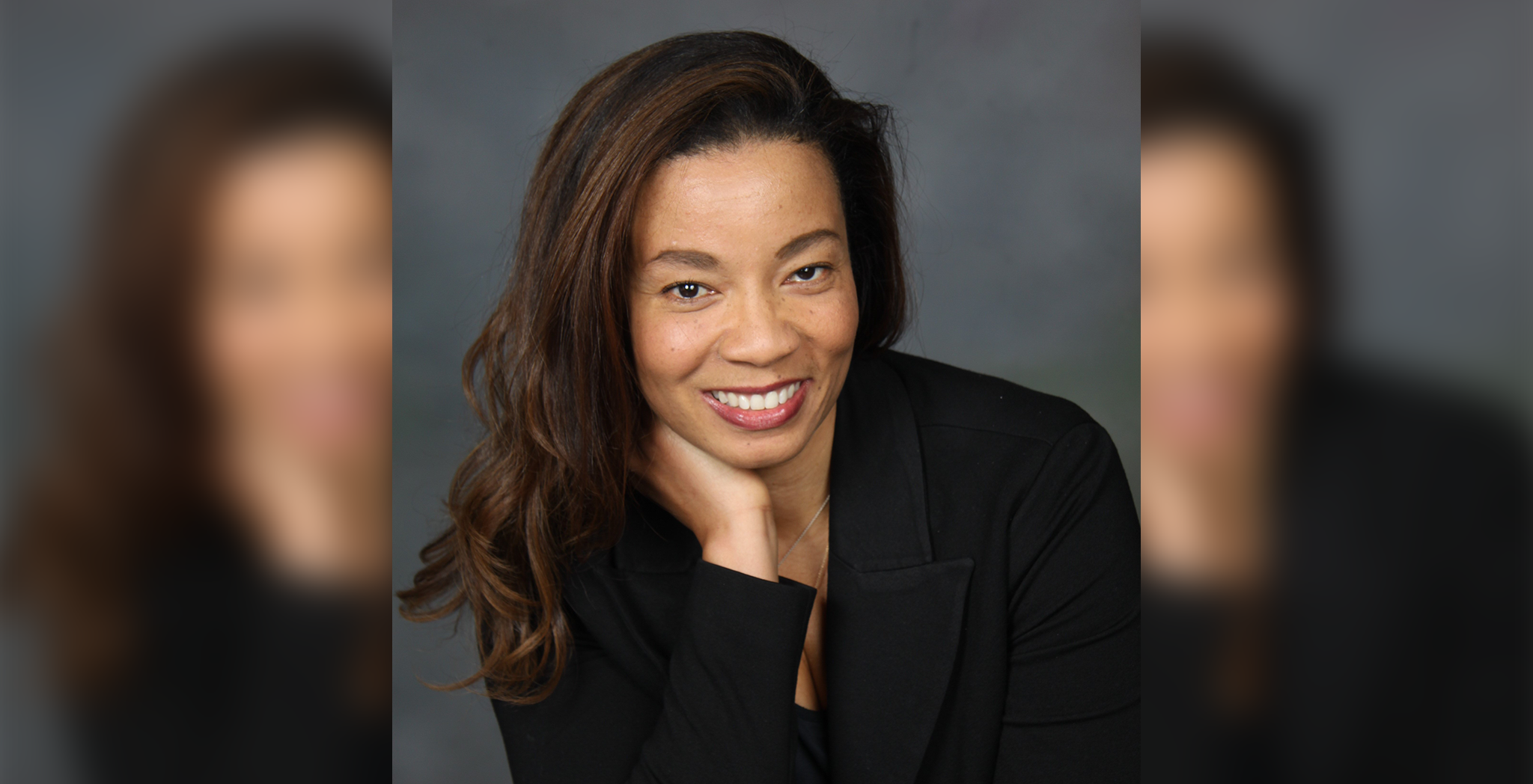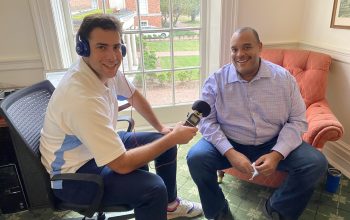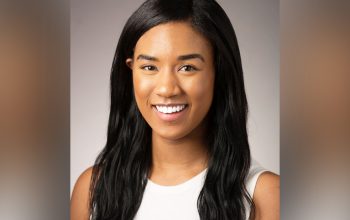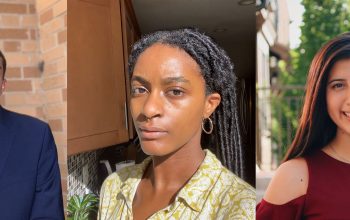The Catalyze podcast: Meet Dr. Brandi Brimmer, Morehead-Cain Alumni Associate Professor in the Department of African, African American, and Diaspora Studies at UNC–Chapel Hill

Catalyze is honored to have Dr. Brandi Brimmer on the series to talk about her first year so far at the University of North Carolina at Chapel Hill, her background in African American social and political history, and her current and upcoming research projects.
Dr. Brimmer, an associate professor in the Department of African, African American, and Diaspora Studies (AAAD), is one of three Morehead-Cain Alumni Professors teaching at UNC–Chapel Hill. She joined the Morehead-Cain and Carolina communities in summer 2021 from Spelman College in Atlanta, where she was an associate professor of history and a Mellon-HBCU Fellow through the National Humanities Center.
She received her bachelor’s degree in history from Spelman and her master’s in African American Studies and Ph.D. in U.S. history from the University of California, Los Angeles.
To hear more from Dr. Brimmer, join her online event on Wednesday, February 23, entitled “Weeping No More: Black Women’s Battles for Civil War Pensions in the Post-Emancipation South.” Her talk is informed by her book, Claiming Union Widowhood: Race, Respectability, and Poverty in the Post-Emancipation South (Duke University Press, 2020).
Learn more about The Road Back to Chapel Hill online event series.
Working across disciplines to study health, wellness for communities of color
Dr. Brimmer’s appointment was added as part of the 2021 Health and Wellness in Communities of Color initiative within the College of Arts & Sciences. Six faculty members joined the University last fall to conduct interdisciplinary research on a broad theme, including two whose research focuses on issues of U.S. slavery, specifically.
Her archival research from the past decade aims to recover the voices of Black people, both free and enslaved, from the American Civil War Archive. The associate professor’s work on Black communities, both past and present, is “vitally relevant to our current societal moment,” said Dr. Claude Clegg, AAAD chair and a Lyle V. Jones Distinguished Professor of African American and Diaspora Studies.
“Dr. Brimmer’s decision to join the UNC–Chapel Hill faculty has greatly strengthened the research and teaching profile of the University as well as noticeably enhanced the visibility of the Department of African, African American, and Diaspora Studies as an important nexus for the study of people of African descent,” the chair said. “Her work . . . is in the best traditions of the University’s commitment to scholarly inquiry and community engagement.”
Dr. Clegg, who holds a joint appointment in the Department of History, is the author of The Black President: Hope and Fury in the Age of Obama (John Hopkins University Press, October 2021).
Music credits
This episode features music by scholar Scott Hallyburton ’22, guitarist of the band South of the Soul. The ending song is “Lights,” by TrackTribe.
How to listen
On your mobile device, you can listen and subscribe to Catalyze on Apple Podcasts or Spotify. For any other podcast app, you can find the show using our RSS feed.
Catalyze is hosted and produced by Sarah O’Carroll for the Morehead-Cain Foundation, home of the first merit scholarship program in the United States and located at the University of North Carolina at Chapel Hill. You can let us know what you thought of the episode by finding us on Twitter or Instagram at @moreheadcain or you can email us at communications@moreheadcain.org.
Episode Transcription
(Sarah)
Dr. Brimmer, it’s such a pleasure to speak with you on campus and in person finally.
(Dr. Brimmer)
That’s right. It’s good to be here. And it’s a beautiful day.
(Sarah)
So you most recently were an Associate Professor of History at Spelman College in Atlanta, and you were also a Mellon HBCU Fellow through the National Humanities Center. So can you share about the research projects you were working on there?
(Dr. Brimmer)
So my time at Spelman was dear to me. I am a graduate of Spelman College, and so it was really wonderful to return home, as we say. I was awarded the National Humanities Award for HBCU faculty. And then, of course, the pandemic hit. So my time at Spelman was truncated, but it meant that I was coming into North Carolina—and the Triangle, in particular—a year before I actually arrived here at UNC. And there, I was working on a project that extends from my book project, the recently published book, Claiming Union Widowhood, introduced me to a number of just interesting protest movements and black leadership that just hasn’t been written about in Eastern North Carolina. And so one of those figures is a claims agent, which is a short hand term that officials in the Pension Bureau would use to describe what, for all practical purposes, was an attorney. And so, digging through a wide array of archival records, I learned of a person by the name of Frederick Douglass. I believe that he renamed himself Frederick Douglass sometime during the Civil War. He was self-taught, began to teach in the public schools of Craven County, North Carolina, to educate black students, and would go on to represent, in the form of a claim agent or an attorney, represent disabled soldiers, as well as the widows of black soldiers who died as a result of disease or disability or injury during the Civil War. So he’s just an incredible figure. And in building what I’m calling sort of a biography of his life, I’m also thinking deeply about black legal communities in the late 19th century. And so his story is providing an arc or a window through which to think about black legal communities and how working class people engage these communities at the turn of the century.
(Sarah)
Well, it sounds like you could just expand on that indefinitely with all of the rich history that you’ve been able to find. Are there other projects or questions that you plan on exploring at Carolina? Is this going to be an extension of the work you’ve mentioned, or what else are you thinking about?
(Dr. Brimmer)
Right now, I’m working on a project—in addition to the Douglass project, which is my priority. But I’m thinking a lot about a history of black intimate life and the possibility of writing a history like that with archival material that I’ve been working with over the last several years. I’m also thinking deeply about the Fort Pillow massacre, the implications and consequences of that massacre for black legal communities as well. And so I’m thinking about a range of different topics, not only that I want to write and think about, but also that I want to introduce into the classroom. And so I’m thinking about also how this research will influence and shape the kinds of classes and questions that I raise with students here at UNC.
(Sarah)
And you’ve already mentioned a few of them, but many of your publications, including your book, focus on the lived experiences of black women in North Carolina. And so I’m curious where that academic interest in the state came from?
(Dr. Brimmer)
When I started the project, people would always say, “Why North Carolina? And why New Bern, in particular?” And my answer to that came over time and after really immersing myself in the archival materials. And my answer to that question now has changed, and it’s simply that free people chose Eastern North Carolina, in particular, as a haven of freedom to expand on pre-existing communities and to think about the possibility of envisions—and implement, rather, I should say, their visions of freedom in the post-Civil War period. And so, I am a historian of slavery and emancipation. I’m deeply interested in questions of gender, family, and community. And in many ways, Eastern North Carolina chose me because I was searching for those questions, thinking about how I might write a project in the Civil War-era period that focused on those questions. And the archival material really led me to Eastern North Carolina. I would add that what it means now is that I’m thinking a lot about public history, and being at UNC puts me in a really unique position to connect with the very communities that I’ve written about. And so, I’m excited about that, in terms of expanding how I’m thinking about my research, and how it connects to not only students, but also communities connected to this institution.
(Sarah)
Can you speak to the archival collections that you’ve been able to find or ones that you’re looking forward to exploring now that you have more geographic proximity to the work itself?
(Dr. Brimmer)
Yeah, that’s a great question. UNC Wilson Library, first of all, you all have some of the most talented archivists in the country. They have been extraordinary and one of the most important collections for African American history in the country. And so being here and having proximity to this collection is really—for our historians of black life in the American South—I‘m just in prime position to access a lot of personal papers from former enslavers, to oral interviews, and, quite frankly, speak to communities about perhaps thinking about what it would mean to archive their own collections and keep them in their communities. So, in addition to manuscript archives, collections, and the tremendous library resources I have here, I’m also thinking about the collections that I have that I’ve collected from the National Archives and how those archival findings can actually enhance what I will find at Wilson Library. But thus far, specifically, I would say, my proximity here and access to Wilson Library has allowed me to really look at many of the families who enslaved many of the people that I write about. And so it’s allowed me to think about the conditions of enslavement that individuals survived and challenged and resisted in their path to freedom.
(Sarah)
Well, as you said, Eastern North Carolina seemed to choose you, and North Carolina seems to make a lot of sense. But are there other aspects of UNC, in particular, or being in North Carolina that made this position—this opportunity—appealing to you? Is there anything else you’d want to share about that?
(Dr. Brimmer)
Yeah, this is always an interesting question for me when people talk about the appeal of working, when I was going through the application process, and now that I’m here, I’m working with an incredible faculty of leading scholars in the field of African American studies, many who have come before me who have laid the foundation for me to be in this position. And so, I’m thinking about students, I’m thinking about administrators here. I’m thinking about scholars who have, some who have come to UNC and done and produced incredible work and have gone on, and many who are still here, who’ve really created a space for me to be here. And so, in that sense, and I’m really grateful for the groundwork that people have provided. And I hope that I can continue to extend the legacy of strengthening the Department of African, African American, and Diaspora Studies, as well as making significant contributions to the Department of History and knowledge-building around black life in the late 19th century.
(Sarah)
We’ll be right back. Stay with us.
Join us this spring for a series of campus-inspired events that will set you virtually on the road back to Chapel Hill and the 2022 Alumni Forum. We’ve lined up an impressive slate of speakers for every Wednesday at noon Eastern Time from February 2 through March 9. You’ll hear directly from Morehead-Cain scholars about the ways they’re working to improve Carolina’s campus, from UNC professors about new curriculum initiatives, and from Morehead-Cain alumni who are experts on the University’s governance structure. We hope the opportunity to reconnect with the Carolina campus, as well as the scholars and alumni who comprise this amazing Morehead-Cain community, inspires you to start making your plans to attend the in-person forum this October. More information to come. And now, back to the show.
Your work also seems highly interdisciplinary in nature. What sort of collaborations with other departments, other colleges, and schools do you hope to get involved in while you’re here?
(Dr. Brimmer)
Since I’ve been here in North Carolina, I’ve just learned about a number of different projects that are happening across centers, happening through different programs. One program I learned about is a partnership between scholars and playwrights here that actually take a work of academic scholarship and think about what that would look like on the stage. That’s something that’s very appealing to me for now. Those are two things that I’m thinking about in particular. I’m also, quite frankly, thinking about life beyond the walls of UNC, to be at UNC and be in close proximity to the Pauli Murray Center, what would it mean to partner with the Pauli Murray Center, and build on resources that colleagues and scholars here at UNC have already established those relationships. So I’m keeping my eyes open. I’m laying the groundwork for some projects right now and to be continued.
(Sarah)
Well, we’re so glad that you’re here, and we’re looking forward to seeing all the great work that you’ll do. I did want to ask, your transition to the University came amidst the national media coverage of Nikole Hannah-Jones, the Pulitzer Prize-winning reporter for whom UNC-Chapel Hill denied tenure and then reversed the decision following the uproar. That must have just been a very difficult time to consider starting a job at Carolina. Is there anything you’d want to share about why you decided to stick with the decision? Was this a factor, or how did you kind of navigate that mentally?
(Dr. Brimmer)
Well, let me say first that Nikole Hannah-Jones was absolutely qualified for tenure here. And when that controversy erupted, I had several different thoughts. And of course, it was a difficult time to think, was I going to carry out this position? I had to think about a lot of things. I had to think about the work that my colleagues in African American and Diaspora Studies had put into the research. And I also had to think about black women colleagues across the profession and across the disciplines, PhDs doing this work and having this experience. And my hope is that what happened with Nikole Hannah-Jones would shine the light on the very particular experiences of emerging scholars who are doing work on slavery and emancipation, but also more broadly, the grueling process it is to achieve tenure, and the very sort of particular obstacles and moving obstacles that black women scholars face, in particular. And so, as this was unfolding, I, of course, was thinking about myself, but I was also thinking very much about the black women colleagues who didn’t have—that were enduring this experience, perhaps being denied tenure, perhaps being rebuked in early reviews, how they were handling that, who didn’t have access to the kind of resources and audience that Nikole Hannah-Jones has now.
Let me also say this. What I also had my eye on was the tremendous sort of organizing that I saw from the faculty, as well as the students, and that ultimately pushed me and inspired me to move forward with my decision to come.
(Sarah)
I’m guessing, as this was taking place, you’ve been working on this kind of research for a long time, and we’ve been seeing a lot about the backlash towards racial equity curriculum. How do you respond to that when students might bring up the Nikole Hannah-Jones situation in the classroom? Are there things that commonly come up of how you try to contextualize these issues with the research, with this long history of working on these types of issues?
(Dr. Brimmer)
Well, I think all I can do is contextualize it and talk about Nikole Hannah-Jones in a larger trajectory of how black women scholars, and, quite frankly, potential applicants or potential students have been treated. When I think about Nikole Hannah-Jones, I’m thinking about Pauli Murray in her denial of admissions. I’m also thinking about higher education’s larger sort of relationship with black women that in many cases has been adversarial, and I have experienced that as well. So I think the way to deal with it is to be honest about it, to contextualize it, and to talk about the significant intellectual contributions that black women have made, not only to this institution, but to the various fields of studies that students are moving forward with and seeking degrees in. There are significant contributions that black women have made, intellectual contributions that black women have made, that oftentimes just don’t get the kind of attention or recognition that is deserved. So that is what I talk about in the Department of African, African American, and Diaspora Studies has provided a platform for me to do that.
(Sarah)
It’s been great talking with you, Dr. Brimmer. Is there anything else you think people would want to know about you, anything you want to share, or that people might be surprised to know about you?
(Dr. Brimmer)
I don’t know if this is a surprise, but it is sort of interesting to me because I’m born and raised in Los Angeles, California, and so how I ended up at North Carolina, where I’m very pleased to be, by the way, because I had so many incredible mentors and scholars that have come before me. But it is sort of interesting that someone from Los Angeles, California, ends up in North Carolina thinking about these questions. So I don’t know if that’s a surprise, but it is something that I ruminate on and think about as I continue my path here.
(Sarah)
Can you share how you did end up in North Carolina, or why did you leave Los Angeles, and when was that?
(Dr. Brimmer)
Well, that’s part of academic life. I finished my PhD at UCLA, and while I would have very much liked to remain in Los Angeles, looking at a job market across the country and doing my own research. I had to think big, bold, but I also needed to eat and I needed to be employed. I initially accepted a position in Nashville, Tennessee, and since then, I’ve sort of moved about. Certainly my work and my interest in slavery and emancipation has driven that. I mean, I did spend time at the University of Maryland working at their Freedman and Southern Society project, which was transformational in terms of how I think about and approach the subject. But I had to eat, so I had to find employment, and it’s taken me to a lot of different places.
(Sarah)
Dr. Brimmer, thank you so much. We look forward to having you at more events, then having your own event, hopefully in the spring, to talk with our scholars and a larger student body.
(Dr. Brimmer)
Thank you for having me. I’m looking forward to it.



